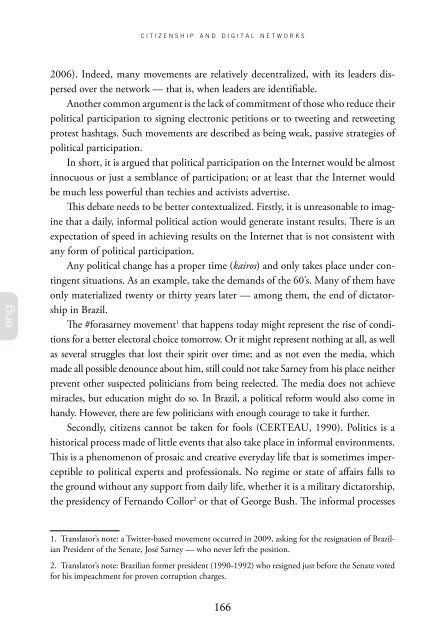Sergio Amadeu da Silveira - Cidadania e Redes Digitais
Sergio Amadeu da Silveira - Cidadania e Redes Digitais
Sergio Amadeu da Silveira - Cidadania e Redes Digitais
Create successful ePaper yourself
Turn your PDF publications into a flip-book with our unique Google optimized e-Paper software.
eng<br />
c i t i z e n s h i p a n d d i g i t a l n e t w o r k s<br />
2006). Indeed, many movements are relatively decentralized, with its leaders dispersed<br />
over the network — that is, when leaders are identifiable.<br />
Another common argument is the lack of commitment of those who reduce their<br />
political participation to signing electronic petitions or to tweeting and retweeting<br />
protest hashtags. Such movements are described as being weak, passive strategies of<br />
political participation.<br />
In short, it is argued that political participation on the Internet would be almost<br />
innocuous or just a semblance of participation; or at least that the Internet would<br />
be much less powerful than techies and activists advertise.<br />
This debate needs to be better contextualized. Firstly, it is unreasonable to imagine<br />
that a <strong>da</strong>ily, informal political action would generate instant results. There is an<br />
expectation of speed in achieving results on the Internet that is not consistent with<br />
any form of political participation.<br />
Any political change has a proper time (kairos) and only takes place under contingent<br />
situations. As an example, take the demands of the 60’s. Many of them have<br />
only materialized twenty or thirty years later — among them, the end of dictatorship<br />
in Brazil.<br />
The #forasarney movement 1 that happens to<strong>da</strong>y might represent the rise of conditions<br />
for a better electoral choice tomorrow. Or it might represent nothing at all, as well<br />
as several struggles that lost their spirit over time; and as not even the media, which<br />
made all possible denounce about him, still could not take Sarney from his place neither<br />
prevent other suspected politicians from being reelected. The media does not achieve<br />
miracles, but education might do so. In Brazil, a political reform would also come in<br />
handy. However, there are few politicians with enough courage to take it further.<br />
Secondly, citizens cannot be taken for fools (CERTEAU, 1990). Politics is a<br />
historical process made of little events that also take place in informal environments.<br />
This is a phenomenon of prosaic and creative every<strong>da</strong>y life that is sometimes imperceptible<br />
to political experts and professionals. No regime or state of affairs falls to<br />
the ground without any support from <strong>da</strong>ily life, whether it is a military dictatorship,<br />
the presidency of Fernando Collor 2 or that of George Bush. The informal processes<br />
1. Translator’s note: a Twitter-based movement occurred in 2009, asking for the resignation of Brazilian<br />
President of the Senate, José Sarney — who never left the position.<br />
2. Translator’s note: Brazilian former president (1990-1992) who resigned just before the Senate voted<br />
for his impeachment for proven corruption charges.<br />
166


